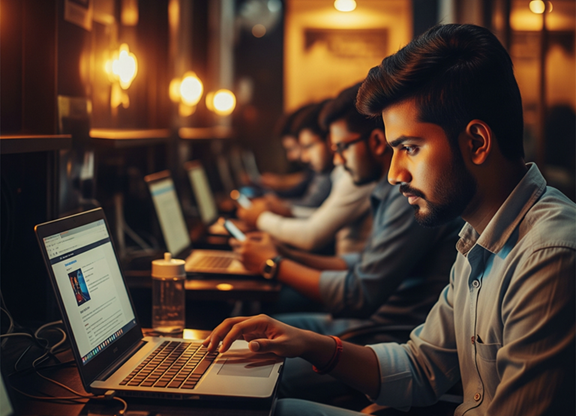

If you are asking “What is my IP address?” , or “Check my IP address“, asking “What is my location on the internet” , wondering “What is my IP location“, or “where am I on the internet“, then you got to the right place – the answer to all of these questions are here below:
India's top VPNs:
- ExpressVPN: Best VPN Service for Speed & Privacy in 2025
- Nord VPN
- Surf Shark – Surfshark VPN & all-in-one cybersecurity suites – Official Site
India's top Antivirus:
- Quick Heal – Quick Heal – Antivirus & Cybersecurity Solutions
- Norton Antivirus
- McAfee antivirus
Why use a VPN?
Protect your digital life with a VPN – your essential tool for online privacy and freedom. With growing concerns about data collection and internet restrictions, a VPN encrypts your connection, masks your IP address, and allows you to bypass geo-blocks, ensuring you can browse securely, access global content, and safeguard your personal information from prying eyes, whether you’re at home or on public Wi-Fi. Don’t compromise on your online security; install a reputable VPN today and experience the internet without limits.
वीपीएन का उपयोग क्यों करें?VPN के साथ अपने डिजिटल जीवन की सुरक्षा करें – ऑनलाइन गोपनीयता और स्वतंत्रता के लिए आपका आवश्यक उपकरण। डेटा संग्रह और इंटरनेट प्रतिबंधों के बारे में बढ़ती चिंताओं के साथ, एक VPN आपके कनेक्शन को एन्क्रिप्ट करता है, आपके IP पते को छुपाता है, और आपको भू–अवरोधों को बायपास करने की अनुमति देता है, यह सुनिश्चित करता है कि आप सुरक्षित रूप से ब्राउज़ कर सकते हैं, वैश्विक सामग्री तक पहुँच सकते हैं, और अपनी व्यक्तिगत जानकारी को जिज्ञासु आँखों से सुरक्षित रख सकते हैं, चाहे आप घर पर हों या सार्वजनिक वाई–फाई पर। अपनी ऑनलाइन सुरक्षा से समझौता न करें; आज ही एक प्रतिष्ठित VPN स्थापित करें और बिना किसी सीमा के इंटरनेट का अनुभव करें।
More web resources
| Krebs on Security | Investigative cybercrime, data breaches, security vulnerabilities. |
| Schneier on Security | Security analysis, commentary on security trends and policy. |
| Graham Cluley Blog | General cybersecurity news, opinion, and practical advice. |
| Bleeping Computer | Cybersecurity news, malware analysis, and tech help forums. |
| The Proton Blog | Privacy, digital rights, security deep-dives, and technical analysis (by Proton VPN/Mail). |
| Mullvad VPN Blog | Extreme focus on privacy, transparency, and technical security updates. |
| Naked Security (by Sophos) | Timely news, analysis, and practical advice on cybersecurity issues. |
| The Hacker News | General, wide-ranging cybersecurity and hacking news platform. |
My location India is all about protecting your privacy:
Virtual private networks (VPN): A VPN encrypts your internet connection, masking your IP address and protecting your online activities from prying eyes.
Anti Virus: Antivirus software is crucial for detecting and removing malicious programs that can compromise your data and privacy.
Password protection apps: These apps securely store and generate complex, unique passwords for all your accounts, significantly reducing the risk of unauthorized access.
Two-factor and multi-factor authentication (2FA/MFA): Adding an extra layer of security, 2FA/MFA requires a second verification step beyond just a password, making it much harder for unauthorized users to access your accounts.
Privacy settings on your phones and computers: Regularly reviewing and adjusting these settings allows you to control what information apps and operating systems can access and share.
Secure Browse habits: Practicing secure Browse, like checking for HTTPS and being wary of suspicious links, helps protect you from online threats and tracking.
Phishing and social engineering awareness: Understanding these deceptive tactics empowers you to recognize and avoid scams designed to trick you into revealing personal information.
Software and device updates: Keeping your operating systems and applications updated is vital, as updates often include critical security patches that fix vulnerabilities.
Public Wi-Fi caution: Exercising caution on public Wi-Fi networks, ideally using a VPN, prevents others from easily intercepting your data.
Awareness of data breaches and Identity theft: Staying informed about data breaches and monitoring your accounts for suspicious activity can help you quickly respond to and mitigate potential identity theft.
How to protect your privacy – click on the links to lean more
Virtual private networks (VPN): A VPN encrypts your internet connection, masking your IP address and protecting your online activities from prying eyes.
Anti Virus: Antivirus software is crucial for detecting and removing malicious programs that can compromise your data and privacy.
Password protection apps: These apps securely store and generate complex, unique passwords for all your accounts, significantly reducing the risk of unauthorized access.
Two-factor and multi-factor authentication (2FA/MFA): Adding an extra layer of security, 2FA/MFA requires a second verification step beyond just a password, making it much harder for unauthorized users to access your accounts.
Privacy settings on your phones and computers: Regularly reviewing and adjusting these settings allows you to control what information apps and operating systems can access and share.
Secure Browse habits: Practicing secure Browse, like checking for HTTPS and being wary of suspicious links, helps protect you from online threats and tracking.
Phishing and social engineering awareness: Understanding these deceptive tactics empowers you to recognize and avoid scams designed to trick you into revealing personal information.
Software and device updates: Keeping your operating systems and applications updated is vital, as updates often include critical security patches that fix vulnerabilities.
Public Wi-Fi caution: Exercising caution on public Wi-Fi networks, ideally using a VPN, prevents others from easily intercepting your data.
Awareness of data breaches and Identity theft: Staying informed about data breaches and monitoring your accounts for suspicious activity can help you quickly respond to and mitigate potential identity theft.